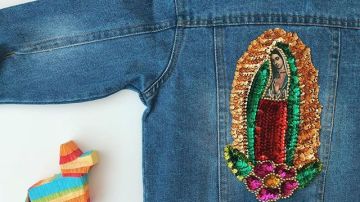These 3 Millennial Latina Entrepreneurs Want To Empower Young Women in Business
With just $500 and a dream, 26-year-old Mexican-American Patty Delgado left her full-time freelancing job to establish clothing and accessories shop, Hija de tu Madre

Photo: Instagram/hijatumadre
With just $500 and a dream, 26-year-old Mexican-American Patty Delgado left her full-time freelancing job to establish clothing and accessories shop, Hija de tu Madre. The Instagram-famous, roll-off-your-tongue shop is most famous for their sequined denim jackets featuring La Virgencita, Frida Kahlo, and Latin American flags. Its growing success has made Delgado one of the most prominent Latinx millennial entrepreneurs.
She admits to regularly receiving questions on how she established her business and as a response she developed her vlog “Ask the CEO”. There she talks about her decision to found the company in November 2016 using $500 in savings to purchase 30 denim jackets, as well as the basics of business including trademarks and expenses.
Now she has a showroom located in Mariachi Plaza in Boyle Heights, the same neighborhood where she was born. The idea of community is something that’s informed her decisions as a business owner and what inspired her to create the vlog.
“I’ve found that a majority of my followers and customers are small business owners and/or entrepreneurs or planning to become one. I’ve learned that there is a major audience of Latina entrepreneurs that is not being heard or catered to, so I’ve taken it upon myself to create resources for hustling Latinas,” she said.
Delgado is one example of a pattern of growth among Latina-owned businesses and their desire to give back to the community through empowerment and information. The 2016 State of Women-Owned Businesses Report found that there are an estimated 11.3 million women-owned businesses in the U.S. with an increase between 2007 and 2016 of 45 percent compared to just a 9 percent increase among all businesses.
The online market in general and social media in particular have helped companies like Hija de tu Madre and Viva la Bonita, one of the most popular brands on social, generate a following and grow their business. Viva La Bonita’s brand name also serves as a mission for Mexican-American Rachel Gomez, 30, who hopes to continue to create products like her “Bonita” sweaters and tees as well as expanding to provide online content that uplifts Latinas.
The LA-based brand boasts an Instagram following of more than 90K and is set to host its second annual pop-up shop “Tacos and Chill” in August in Los Angeles.
Since founding the company in 2014, she has gradually and organically grown her social media following and this year she developed her Mujeres Can Do Anything Youtube series and podcast.
“I started my brand with more than just a mission to sell a product. I wanted my brand to turn into a platform that would inspire women to follow their dreams and show them that it is possible to have the career you truly want to have.” The six-episode series features Twisted for Sugar founder Lucia Rios, music manager Doris Munoz, and blogger Lizbeth Hernandez of IMLV talking about their respective careers and culture and how their upbringing influenced them.
Focusing on self-made businesswomen, Gomez emphasizes they are “proof that with hard work, faith, and dedication, anything is possible.” Gloria Lucas is a 27-year-old Xicana body positive advocate whose own experience with an eating disorder inspired her to create Nalgona Positivity Pride in 2014, a Xicana-indigenous body-positive organization that provides intersectional eating disorders education and community-based support for people of color. Her Etsy shop features inspiring tees with phrases including “Decolonize Body Image” and her Instagram following of more than 65K proves the extent of her reach.
Now she works as a public speaker on eating disorders and offers Nalgona Positive School with the first course focusing on decolonization. The philosophy behind NPP pervades every aspect of her endeavors from the school to her body positive pool party this month.
“I feel digital spaces are crucial for interrupting educational systems that align with oppression,” says Lucas. “Our online course has been instrumental to many for unlearning and reconnecting to misplaced knowledge.”
That sense of empowerment is a crucial undertone running through all three shops that commonly pervades their social media accounts.
“I want our followers to know that they are not alone and that we can create our own opportunities of healing. Merchandise is just one of the many ways I share my ideas and create awareness around body-image, colonialism, and eating disorders,” she said.
As the Latin-owned business ecosystem continues to flourish, it’s important to note that, like Delgado, most are using their own money to make it. According to a Stanford study, when Latino entrepreneurs start a business, 70 percent of their funding comes from personal savings with just six percent coming from commercial loans. And yet Nielsen found that Latinos are now the most influential group generating $1.5 trillion as consumers.
“Access to information is what our community needs to keep thriving,” Delgado said.
Business-savvy knowledge, a hustling spirit and a unique product seem to be key factors to their successes.
“My number one piece of advice is to not be basic. Being basic is a sin. Be your weird self,” Lucas said. “ Don’t wait to get discovered or validated. You go out there and create your own opportunities. Your representation matters. Also know that you can love the hustle and hate capitalism at the same time. It’s ok.”
Delgado seconds that sentiment reminding potential entrepreneurs that the struggle is inevitable but should not be a deterrent.
“Know your worth. And don’t let others dim your worth just because they don’t find value in your work and art,” Delgado said.

















